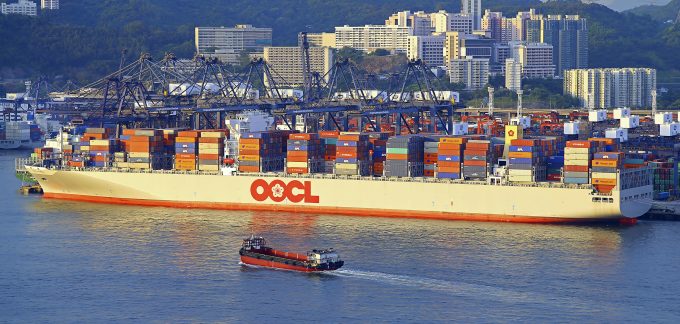Using Amazon Air services 'a win-win' for 'absolutely satisfied' K+N
Amazon Air has received a ringing endorsement for its airfreight services from Kuehne + Nagel ...
AAPL: SHIFTING PRODUCTIONUPS: GIVING UP KNIN: INDIA FOCUSXOM: ANOTHER WARNING VW: GROWING STRESSBA: OVERSUBSCRIBED AND UPSIZEDF: PRESSED ON INVENTORY TRENDSF: INVENTORY ON THE RADARF: CEO ON RECORD BA: CAPITAL RAISING EXERCISEXPO: SAIA BOOSTDSV: UPGRADEBA: ANOTHER JUMBO FUNDRAISINGXPO: SAIA READ-ACROSSHLAG: BOUYANT BUSINESS
AAPL: SHIFTING PRODUCTIONUPS: GIVING UP KNIN: INDIA FOCUSXOM: ANOTHER WARNING VW: GROWING STRESSBA: OVERSUBSCRIBED AND UPSIZEDF: PRESSED ON INVENTORY TRENDSF: INVENTORY ON THE RADARF: CEO ON RECORD BA: CAPITAL RAISING EXERCISEXPO: SAIA BOOSTDSV: UPGRADEBA: ANOTHER JUMBO FUNDRAISINGXPO: SAIA READ-ACROSSHLAG: BOUYANT BUSINESS

OOCL was too small to compete with mega-carriers and needed access to a large capital base to succeed, its chairman said today.
OOCL returned to the black in the first six months of the year, contributing a net profit of $25.3m to the H1 result of its parent, Orient Overseas International Ltd, (OOIL).
This compares with a loss of $82.4m recorded in the same period of 2016.
The result was achieved on revenue up 15.2% to $2.6bn and earned from 6.8% growth in the carrier’s liftings, at 3.1m teu.
The improved return was realised despite the average cost of bunker fuel for its vessels increasing 64% to $306 per tonne from $186 in the same period of last year.
Mr CC Tung, OOIL chairman, said: “We have begun to see a slow and steady recovery from the tough market conditions that characterised 2016.”
But he remained cautious, saying the improvement in the supply/demand balance in the liner industry was not a sign of a “booming market”.
“We are far from that,” he said, but noted that it was the first time since the financial crash that the supply/demand balance had not worsened year-on-year.
Mr Tung believed that if orderbook suspension discipline could be maintained, “the industry will at least have the chance to start to absorb some of the excess capacity”.
He said the shape of the liner industry had “changed dramatically” after a wave of mergers and acquisitions and the collapse of Hanjin Shipping. But Mr Tung suggested that, over time, the consolidation would “help to provide a more stable context for the industry”.
Explaining the rationale behind OOIL’s decision last month to accept a $6bn takeover bid from Cosco Shipping and Shanghai International Port Group, Mr Tung said the deal provided an opportunity to merge “the highly respected OOCL brand” with Cosco’s size and scale and capital base.
“For years, we have achieved scale benefits by means of alliance membership and the deployment of the right, often the largest, vessels in each tradelane. These techniques, alongside our highly skilled employees, our customer base, our IT system, our focus on cost efficiency and our robust balance sheet, go together to drive the success of our group.
“However, as the industry consolidates at speed, with the largest players now having millions of teu in carrying capacity, the capital base necessary to operate successfully and to establish a place among the leading industry participants is becoming increasingly sizeable,” explained Mr Tung.
He said the deal “would create a combined group that would have a very strong chance of maintaining and building a status as one of the very best performers in the industry”.
OOCL currently operates the biggest, by capacity, containership in the world, the 21,413 teu OOCL Hong Kong, the first of a series of six vessels ordered.
At group level, OOIL earned some $49m from its property investments, including a $30m revaluation of its Wall Street Plaza property in New York. After tax, its consolidated net earnings for H1 were $53.6m, versus a loss of $56.7m in the same period of 2016.
Comment on this article